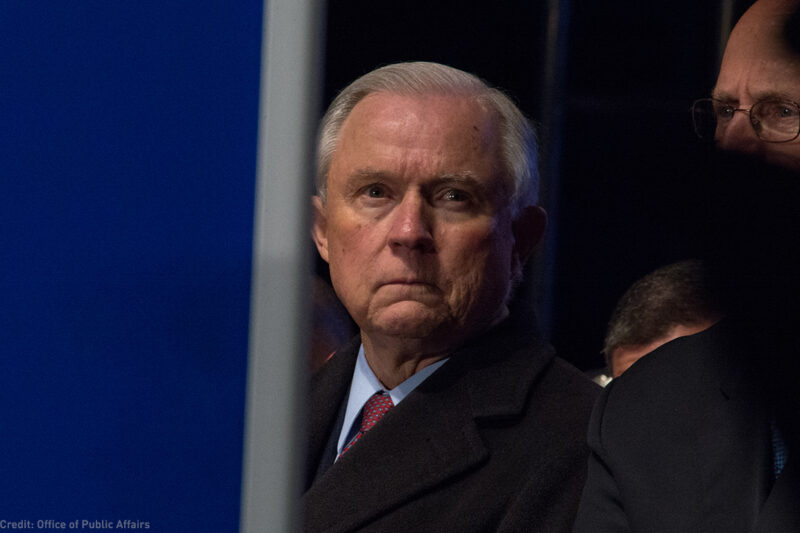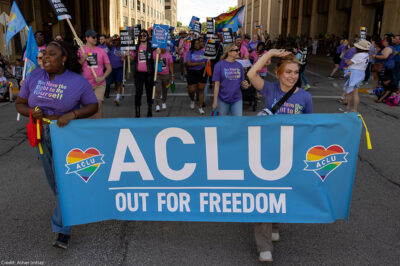
Jeff Sessions’ Department of Justice recently announced yet another attack on transgender people. This time, he’s targeting transgender people in the Bureau of Prisons with a new policy statement mandating placements based on assigned sex at birth except in rare cases and erasing hard-won changes to BOP policy that allowed transgender prisoners to be placed in accordance with their gender identity. We sat down with Chase Strangio, staff attorney with the ACLU LGBT & HIV Project, and Amy Fettig, deputy director of the ACLU’s National Prison Project, to discuss what this means for transgender people in prison and the ACLU’s work going forward.
Last Friday, the BOP announced a new rule concerning transgender prisoners and undid some Obama-era rules. Can you explain what changed and how it affects trans prisoners?
Amy: The former rules required that gender identity — a person’s authentic, core understanding of their own gender — play a central role in where a person is held in a male or female prison. Now, the BOP is saying gender identity doesn’t matter really and what they call “biological sex” will determine placement. That is going to put a lot of people in danger.
Chase: The old policy — though certainly nowhere near perfect — was one that took decades of advocacy work to develop, and lots of prisoners fought and suffered to get to a better place with respect to BOP policy.
Notably, “biological sex” is never defined in the policy, and it seems to mean anything other than the gender that trans person knows themselves to be. Even though BOP attempted to undermine the safety of trans people in custody, they cannot change federal law, regulations, or the Constitution, and all of those things still protect trans people (however tenuously) and we will fight to ensure that they are enforced.
Amy: BOP is violating the law by not following the Prison Rape Elimination Act (PREA), which is mandatory for federal and state prisons and jails around the country. PREA requires that a person’s own sense of where they will be safer be given real consideration. Now the BOP says that only in “rare” circumstances will anything beyond “biological sex” be considered. This is especially troubling because it sends the wrong message to prisons and jails around the country. If BOP doesn’t follow the law, how can we expect others to?
You said that it took work from transgender people and advocates over the course of decades to create the previous rules. During that time, and since then, what have we learned about the conditions for trans people in the prison system.
Chase: The conditions for all people in prison are abysmal and inhumane, so we should start from that first premise. And then on top of that, trans people experience particularly harsh conditions because the sex-segregation of prison and the systematic anti-trans bias within the system make it almost impossible for trans people to survive.
Amy: In fact, trans people are the most vulnerable people in prisons and jails. Almost 40 percent of trans prisoners report being sexually assaulted in prison. And nearly 30 percent are placed in solitary confinement mostly because they are vulnerable.
Chase: One California study found that 59 percent of trans women in men’s prisons in California had experienced sexual assault, while less than 5 percent of the general population reported sexual assault.
Let’s take a step back. What do we know about transgender people who are in our criminal justice system and how this community compares to our general prison population?
Chase: Our entire criminal legal system is the product of the over incarceration and policing of people of color and this is also true of transgender people of color. In one survey nearly 50 percent of Black trans women reported having been incarcerated at some point in their lives.
Due to family rejection, discrimination in schools and workplaces, housing discrimination, and lack of access to health care and ID, trans people are disproportionately living in poverty and homelessness. Since we criminalize poverty in this country, that also drives trans people into the criminal legal system.
Not to mention that trans folks are often profiled as sex workers or engaged in the drug and sex trades to survive.
Amy: Too often prison and jail are used to deal with issues that could be far, far better handled in the community. But we’ve left incarceration as the only social safety net available in this country. It makes no sense.
What about the ACLU’s involvement here. Can you talk a little about the transgender people the ACLU has represented?
Chase: We have represented prisoners who have been denied access to health care related to gender transition, including a group of Wisconsin prisoners challenging a terrible law that tried to restrict any government funding for gender affirming care, Chelsea Manning in her challenge to the Department of Defense, and many others. We have also worked collaboratively with prisoners on many policy issues, including in the many rounds of providing comments on proposed PREA regulations.
Amy: Back in 1994, we represented Dee Farmer in front of the Supreme Court (Farmer v. Brennan) in what has become the seminal prisoner rights case.
Chase: And then for the 20th anniversary we organized a conference called Deliberate Resistance to commemorate all the work that Dee did.
Amy: I was actually on the phone with Dee last week, and she is still fighting for the rights of trans prisoners. She’s a remarkable person. And I am proud that the ACLU was able to represent her.
Chase: We also have been involved in many cases on behalf of trans prisoners and detainees who have been subjected to violence in police lock-up, jail, and prison and have worked to ensure that they are able to have their day in court. Even though there is so much work that remains, some amazing people have fought back against the many inhumane and often torturous conditions they have faced.
Amy: Chase and I are working on a case right now about health care for transgender people in prison. It’s getting better in some places, but still too many prisons are denying people the lifesaving and life-affirming care they need.
Indeed, can you talk a bit about what would be a better set of conditions for transgender people in prison, and how the BOP rules supported those conditions?
Chase: The most important thing is to first get people out of prison. We incarcerate too many people, and a lot of our work has to be about disrupting the drivers of incarceration. People should be able to survive while they are locked up, released sooner, and have access to basic survival needs when they do.
The former BOP policy that was rolled back allowed for the actual prisoner to assess the conditions that would be safest for them. We need policies that provide care that people need, that recognize the gender that people are, and that ensure that people receive safer housing and access to programming.
Amy: One of the first things that prisons should do is treat prisoners like people — not just numbers.
These changes are a profound culture shift in prisons. And it needs to happen if they are ever going to become anything but the warehouses of horror that they now are. BOP’s policy rollback is in the exact wrong direction. And it sends a message of disrespect, discrimination, and disregard that will have implications down the line.
“Warehouses of horror” is quite the image. What is the ACLU doing at this point, with the rollback of the rules, to support transgender people in prison?
Chase: The ACLU is working in a broad coalition of groups to try to identify what trans people in custody need in confinement settings across the country. We will keep filing lawsuits to ensure people receive health care and are not subjected to unconstitutional, cruel, and violent conditions.
Amy: It’s important that we let people know what’s happening and why it’s important. Prisons like to do things quietly so you won’t know, especially because the majority of the public can’t see what’s happening. We have to make sure that people know and understand what undermining the rights of our most vulnerable people actually means.


